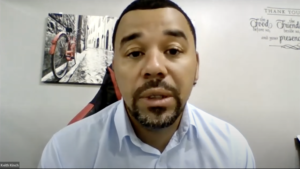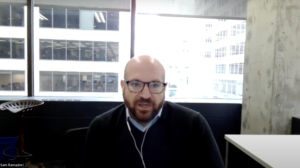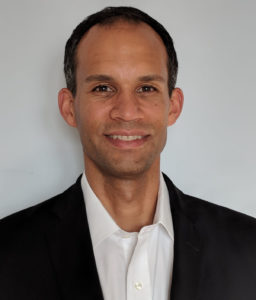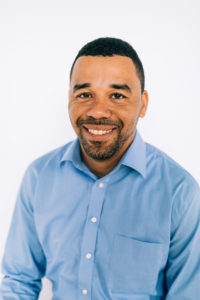
Event overview
Intelligent, Inclusive and Impactful – A roundtable on the opportunities and barriers for intelligent building solutions to decarbonize rapidly and cost effectively
Wednesday, September 22
What role will intelligent buildings play in the just transition towards a sustainable economy? What opportunities must the building sector seize to create green buildings? And what hurdles remain to reach collective, market-wide goals? These questions were at the center of the conversation during the Dynamo Energy Hub event “Intelligent, Inclusive and Impactful – A roundtable on the opportunities and barriers for intelligent building solutions to decarbonize rapidly and cost-effectively.”
At the event, Dynamo brought together experts from the building decarbonization sector to discuss the ways their organizations, and the industry at large, are grappling with questions of how to bring intelligent decarbonizing technologies to scale, what it means for a building to truly be carbon-free, and how to make the transition as just as possible.
And given buildings contribute nearly 30% of total emissions that come out of the U.S, insightful discussions around these timely questions like these are needed now more than ever.
To kick off the conversation, moderator Ziggy Majumdar, Senior Advisor at NYSERDA, invited each panelist to share how they and their organization have been working on building decarbonization issues.

Keith Kinch, Co-Founder at BlocPower, dove right in by sharing the ways BlocPower has been using proprietary software to make buildings ‘smarter.’ He continued by emphasizing the need for simplicity in the solutions. As Keith put it,
“As we think about decarbonizing small to medium sized buildings in frontline communities, we think about how we make it as simple as going to check your email, or sending text, or being able to connect to a manufacturer or a contractor that quickly.” – Keith Kinch, Co-Founder at BlocPower
Keith furthered his point by stating how frontline communities (typically middle and low-income) are expected to feel the first and worst effects of climate change, and thus they are the communities that will most need dependable and low-cost heating and cooling systems.
Sara Neff, Head of ESG at Lendlease Americas, also understands how crucial smart buildings will be in achieving a low-carbon future. From her vantage point at Lendlease Americas, a leading property developer, builder and owner, Ms Neff understands and underscored that there’s a vital need to ensure equity in the implementation of smarter, greener buildings.
“Folks who live in affordable housing should get to live in intelligent buildings. We’re missing a big opportunity on an equity standpoint when we don’t hold affordable housing accountable to the same levels of efficiency that we hold the rest.” – Sara Neff, Head of ESG at Lendlease Americas

In essence – the building and energy sector must ensure that as the sector scales and implements the most cutting-edge technologies on the market, equity must keep pace with that growth to truly reach carbon neutrality.
Shedding light on the importance of smart building technology, Sam Ramadori, President at Brainbox AI, highlighted the industry wide missed opportunity of not harnessing autonomous artificial intelligence and data.
“The thing with this industry is that you’re generating huge amounts of data every minute of every day, and then it gets flushed down the toilet, and this is just the state of our sector. It’s a massive opportunity to go take that data and make something valuable out of it; not just in terms of reporting output, but actual kilowatts saved and equipment life expectancy increased, GHG reductions, et cetera.” – Sam Ramadori, President at Brainbox AI
Taking extremely complex data and normalizing its use when designing buildings can keep homeowners and building operators better informed about the ways their buildings are using energy and can become more energy efficient. This will be a huge step forward, but Sam noted that while AI will solve part of the problem tackling the entire challenge of building decarbonization will take input from many different technologies and other sectors beyond property technology.
As the panelists continued to discuss the challenges that decarbonization of the building sector will face, one theme arose: the challenges of securing capital. The challenge of capital is especially interesting because it presents itself both within the building financial sector as well as at the community level.
Sara Neff discussed how it is challenging to finance intelligent buildings because the energy savings are difficult to predict, complicating the ways that investors can make predictions about how the building will perform. On the other end of the spectrum, Keith discussed the challenges that historically underserved communities face in terms of additional barriers to accessing capital.
Given lower and middle-income communities are less likely to be able to afford intelligent building retrofits, one of BlocPower’s solutions is to offer no money down and low cost options to better serve these communities. Innovative solutions like this will be required at every level to successfully finance and install smart building technology, especially in frontline communities.

Panelists also emphasized creating a system that is useful to the actual people who live their lives in residential buildings. As Sara put it,
“You have to remember who the end-user is: it’s a homeowner.” – Sara Neff, Head of ESG at Lendlease Americas
Sam, at Brainbox AI takes this point very seriously, working to generate data analysis that is useful to homeowners by generating outputs that tell homeowners not only information about the current energy use of the building, but also how much energy the system has saved and how efficiently it is working. This touched on Keith’s point earlier about how crucial customer education and buy-in is to any building decarbonization plan. When data is available, better customer decisions can be made. All panelists agreed that an “intelligent building” has to be accessible and understandable to those who will be experiencing it day in and day out.

As panelists gave their closing statements, it became clear that while new technology will be a vital tool to make the transition to intelligent buildings, it is also going to take community buy-in, outreach, and adoption to achieve the ambitious targets set by the building sector. At the end of the day, new and innovative technology will not be helpful if it cannot be scaled up and deployed in the places where we all live, work and play–and that will take outreach and education.
A more insightful panel could not have been chosen to discuss this increasingly timely topic; the strength of Dynamo is not only it’s rich network which brings thought leaders together but also it’s ability to find concrete answers to the most pressing industry wide questions.
Dynamo is an organization founded on the idea that personal connection and networking are vital to the energy and technology sphere, and this leadership panel perfectly encapsulates what happens when ideas meet action. You can find the full recording of the panel discussion here.
Event description:
The ability to intelligently monitor and manage buildings offers potential for saving energy, increasing power grid performance through building-grid interactivity, reducing building operations costs, and increasing environmental benefits to occupants and owners. Despite a relatively low cost compared to interventions like deep retrofits and major equipment installations; sensors, controls and their widespread integration appear vastly under-utilized. The panel will address key questions in building innovation, with an emphasis on intelligent, or “smart buildings” as being a key solution for decarbonization, adaptation and resilience. Discussion themes include: What is considered an intelligent or smart building? What is the expected value proposition and which potential benefits are the most effective in driving adoption? What are the barriers now faced by building owners, occupants and solutions providers? How can deployment be further accelerated, and how can government and industry better collaborate to do so? Hear from leaders in building sustainability, solutions providers and other stakeholders, to learn about barriers and opportunities to deploying high-value intelligent building solutions. Come to listen and engage to move us all forward on the potential for buildings as a climate solution.
Panelists included:
Sara Neff, Head of ESG at Lendlease Americas

Sara Neff is the Head of ESG, Lendlease Americas, where she provides leadership and management oversight in developing, implementing and driving Lendlease’s corporate sustainability framework in the Americas region. Prior to that role, she served as Senior Vice President, Sustainability at Kilroy Realty Corporation. Under her leadership, Kilroy has been recognized as a leader among publicly traded real estate companies on sustainability in the Americas by GRESB for seven of the last eight years as well as being recognized by NAREIT, and achieved carbon neutral operations at the end of 2020.
Ziggy Majumdar, Senior Advisor at NYSERDA

Since February 2020, Ziggy Majumdar is a Senior Advisor on NYSERDA Innovation’s Advanced Buildings Team. Previously, he was Director of Development at the Lighting Research Center at RPI, and before that worked on several buildings and energy related programs at ARPA-E (including SENSOR and SHIELD). He successfully started and operated a small business over 3 years and worked at Booz Allen Hamilton for nearly 7 years, helping to launch and manage R&D programs at DARPA, ARPA-E, other federal agencies, and private companies. His prior experience involves developing and fielding sensor technologies with applications in buildings, agriculture, medicine and security. He has a PhD in physics from the University of Illinois Urbana-Champaign and BA in physics from the University of Pennsylvania. He was born in Brooklyn, grew up in Montrose, NY and now lives in the Capital region near Albany, NY.
Sam Ramadori, President, Brainbox AI
 Sam Ramadori oversees the execution of BrainBox AI’s growth-oriented business plan, leads the senior management team, and manages investor relations. As a sustainability enthusiast, he brings a passion for driving impactful change, particularly towards fighting the climate crisis, which inspires and motivates the team at BrainBox AI to continuously work towards our vision to save the planet with AI. Sam’s background includes private equity investing and senior management roles, with extensive experience supporting management teams in the development and implementation of their commercialization strategies. Before joining BrainBox AI in 2019, Sam held senior operational, investor, and deal execution roles at private equity firms, including Walter Capital Partners and Brookfield Capital Partners. He has an MBA from the Ivey School of Business as well as degrees in common law and civil law from the University of Ottawa.
Sam Ramadori oversees the execution of BrainBox AI’s growth-oriented business plan, leads the senior management team, and manages investor relations. As a sustainability enthusiast, he brings a passion for driving impactful change, particularly towards fighting the climate crisis, which inspires and motivates the team at BrainBox AI to continuously work towards our vision to save the planet with AI. Sam’s background includes private equity investing and senior management roles, with extensive experience supporting management teams in the development and implementation of their commercialization strategies. Before joining BrainBox AI in 2019, Sam held senior operational, investor, and deal execution roles at private equity firms, including Walter Capital Partners and Brookfield Capital Partners. He has an MBA from the Ivey School of Business as well as degrees in common law and civil law from the University of Ottawa.
Keith Kinch, Co-Founder, BlocPower
 Keith Kinch serves as General Manager and co-founder at BlocPower. Keith received his undergraduate degree at John Jay College and his graduate degree at American International University. He spent eight years as a community organizer, and two years as Deputy Field Director in New York State for the Democratic National Committee under President Obama’s grassroots arm Organizing for America. He helped advance key pieces of legislation such as the Affordable Healthcare Act. In the summer of 2016, Keith led the Solarize Brownsville campaign where more than 200 homes were outfitted with solar panels. Solarize Brownsville brought together community partners, local residents, and the selected solar installer to successfully demonstrate that solar power can make an impact in low-to-moderate-income communities. It still stands as one of the largest solar projects in New York State history. In 2017 Keith led the partnership with the Mayor’s Office of Sustainability, and Department of Housing Preservation and Development on Community Retrofit NYC program to produce over 500 retrofits for 5-50 unit multi-family buildings in Con Edison’s Brooklyn Queens Demand Management zone. The project has won a national award and was completed one year ahead of schedule.. In 2019 BlocPower partnered with Con Edison and NYSERDA to launch “Green the Bronx,” a campaign to help hundreds of multifamily building owners in the Bronx convert their fossil fuel heating systems to clean heating & cooling systems. As part of the partnership, Con Edison, NYSERDA and BlocPower will provide engineering, project management, customer education, financing, and no money down equipment leases for building owners. Keith currently resides with his wife and two children in New York.
Keith Kinch serves as General Manager and co-founder at BlocPower. Keith received his undergraduate degree at John Jay College and his graduate degree at American International University. He spent eight years as a community organizer, and two years as Deputy Field Director in New York State for the Democratic National Committee under President Obama’s grassroots arm Organizing for America. He helped advance key pieces of legislation such as the Affordable Healthcare Act. In the summer of 2016, Keith led the Solarize Brownsville campaign where more than 200 homes were outfitted with solar panels. Solarize Brownsville brought together community partners, local residents, and the selected solar installer to successfully demonstrate that solar power can make an impact in low-to-moderate-income communities. It still stands as one of the largest solar projects in New York State history. In 2017 Keith led the partnership with the Mayor’s Office of Sustainability, and Department of Housing Preservation and Development on Community Retrofit NYC program to produce over 500 retrofits for 5-50 unit multi-family buildings in Con Edison’s Brooklyn Queens Demand Management zone. The project has won a national award and was completed one year ahead of schedule.. In 2019 BlocPower partnered with Con Edison and NYSERDA to launch “Green the Bronx,” a campaign to help hundreds of multifamily building owners in the Bronx convert their fossil fuel heating systems to clean heating & cooling systems. As part of the partnership, Con Edison, NYSERDA and BlocPower will provide engineering, project management, customer education, financing, and no money down equipment leases for building owners. Keith currently resides with his wife and two children in New York.
Intelligent, Inclusive and Impactful – A roundtable on the opportunities and barriers for intelligent building solutions to decarbonize rapidly and cost effectively
Wednesday, September 22 2021
11:00 AM EST
Zoom

Intelligent, Inclusive and Impactful – A roundtable on the opportunities and barriers for intelligent building solutions to decarbonize rapidly and cost effectively


